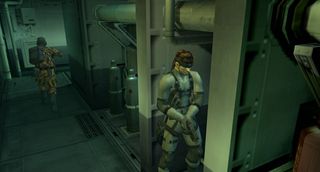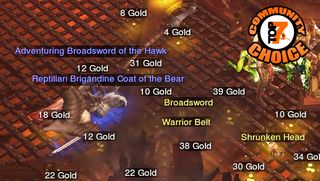The Top 7... Totally unrealistic things games do all the time
Shoot off the screen to reload
Realism is overrated

Updated with the Community Choice winner!
Video games have slowly crawled out of the primordial soup of pixels and bytes towards the inevitable, unflinching uncanny valley, but theyve still stayed relatively primitive in many ways. Melee is still usually more powerful than a gun because of balancing or something, and youre able to run forever without sleeping, eating, or using the bathroom because forcing those restrictions on players wouldnt be fun.
But for every blatantly obvious example of ignorance towards realism, there are a dozen that youre so comfortable with that youve likely never even doubted them--things so ingrained in the fabric of gaming that to question them would be blasphemy. Well, thats what were here to do today, friends; to open your eyes to the things in gaming that dont actually follow the rules of the world. Well warn you, though: Once youve seen what were about to show you, theres little chance of you ever being able to unsee it.
7. Eating food to gain health

Health bars, in general, are pretty much nonsense. The idea that they can be filled by chewing some chicken? Thats the icing on the metaphorical, unrealistic cake. Its not hard to see where the core idea of this came from, though: Since potions, as a concept, arent actually real, the obvious proxy in non-fantasy games is something that actually does help you continue to live. Games dating back to Gauntlet and beyond have allowed dying players a second chance at life upon consumation of calories (Blue Warrior needs food badly!), and gaming seems reluctant to let the idea to die.
It still shows up in everything from BioShock to Grand Theft Auto, and nary a one has attempted to explain why eating a sandwich in the middle of battle will suddenly mend stab wounds or bullet holes. Sure, popping pills doesnt make much more sense when it comes to actual healing, but at least it can make the pain go away--we cant really say the same for a bowl of spaghetti slurped up while running away from a dragon.
6. Carrying hundreds of pounds of items, totally unencumbered

Its relatively common for role-playing games to limit the number of items that a character can carry, and that, in and of itself, isnt actually a bad idea. The average warrior, no matter how strong, can only bring a certain amount of gear on an adventure. Problem is, this limit is usually imposed for game balance reasons, and never really shows where all of this stuff actually being held.
The Elder Scrolls V: Skyrim uses weight to deliniate how much a character can carry, but stronger Dovahkiin can hold dozens of sets of armor and weapons and hundreds of potions. Where do they even keep these things? Diablo III at least takes space into account, but not weight, so it still ends up being absolutely, hilariously silly if you actually think about it. Most games just throw up their hands and give players a specific number of items they need to remain under, but very few games actually have inventory systems that factor in the basic principles of, you know, physics.
Sign up to the GamesRadar+ Newsletter
Weekly digests, tales from the communities you love, and more
5. Leveling up

Yes, doing things will make you better at doing the thing that you were doing in the first place--that part is true. The way that games, mostly RPGs, actually show this, though, is by granting players experience for their work. Though some games separate different tasks into different experience buckets, most merge them into one bar. Picked a lock? Generic experience. Shot a bear? Generic experience. Fast-talked a car salesman into a lower financing rate? Generic experience. Get enough experience and you level up, and then things go from sort of making sense into wa ha de do der.
Leveling up will give you access to new skills and generally improve everything there is to improve. So, apparently, because you killed a Veteran Drow Pantywaist of Greater Smiting you are smarter, and can... carry more objects? And are now a psychic for some reason? Leveling up and gaining skills and attributes attempts to take the concept of learning by doing and turn it into a gameplay mechanic, but instead its a silly catastrophe, existing solely to trick you into getting excited about persistence.
4. Jumping out of water

Though this often appears in massively multiplayer online games, its a mechanic that pops up in most open-world games: The ability to swim on the surface of the water, and then to... jump. Like, just to jump up, as though you werent wading in water. Not sure what we mean? Well, go find a swimming pool, doggie-paddle out to a part where you cant touch the ground (and take off your swimmies, youre an adult for crying out loud), and then jump. Its fine, well wait here.
Couldnt do it, could you? Thats because its not something that can be done. Sure, if you gain enough speed you might be able to pull a dolphin/shark/Free Willy and get a few feet up, but thats not what games do; they let you just... jump. This one is just a flat-out failure to follow the basic laws of gravity. That, or the developers that implement the ability to leap out of the water when on the surface havent gone swimming in a long, long time.
3. Reloading without losing the ammo in the wasted magazine

With most automatic or semi-automatic weapons, reloading means popping out an empty magazine (metal rectangle full of neatly-stacked bullets) and inserting a full one. Its fairly simple. Games usually show this happening on screen, as disembodied hands appear to toss the old away and replace it with the new. Where things go wrong is in what changing out a mag actually does. If you load a magazine with 30 bullets in it, shoot five shots, and then throw the remainder away, youve technically wasted 25 bullets. Those bullets dont magically get recycled back into your gun--youre not being followed around by some bullet goblin who collects your spent ammo and shoves them back onto your person. They should be gone, since youve wasted ammo.
A handful of games have gotten this right, but theyre usually immediately labeled as sims for getting the core concept of reloading even remotely correct. Meanwhile, popular military shooters like Battlefield 3 and Call of Duty continue to perpetuate the notion that magazines full of bullets are a renewable resource.
2. Regenerating health

Oh no! Youve been shot, stabbed, or beaten within an inch of your life. Quick, what do you do? If you answered stand there until the screen stops glowing red, then youre an idiot. The idea of regenerating health is actually a fairly new one in games, and didnt really become all that popular until the last generation. In the past, you had a health bar that would slowly deplete as you were wounded, which, while not really a strong representation of mortality, is at least grounded in the idea that if you get hurt too much youll die.
Regenerating health, however, assumes that video game protagonists are immortal. It says that the main character of just about every shooter franchise in the past seven years is a mutant with the ability to mend wounds by... loitering. When Nathan Drake gets shot, all he needs to do is hide for a few seconds and the bullet goes away! No need for surgery! Dont worry about replacing lost blood! Infection inschmection! Just hang out and the healing power of absolutely nothing will get you back on your feet in no time.
1. Seeing around corners without looking

This trope is as old as gaming itself. In just about every single third-person game you can see things that your character cant, and often youre asked to use this information to make the character do stuff. In stealth games you watch a guard while your stealthy hero hides completely out of sight, waiting until the foe is gone to move the character to another corner. This is accomplished without special stealth tools, or awesome futuristic technologies--its just an element of the third-person camera that allows you to blatantly cheat reality.
In shooters its even worse; you can not only hide behind cover, but you can see when your enemies pop up out of theirs. Seriously, how does that make sense? The only downside to hiding behind a chest-high wall is the fact that you cant see anything--breaking this rule breaks everything. Some games even allow moderately accurate blindfire, which is tantamount to magic. You might as well break out your robe and wizard cap, people, because apparently were all in freaking Hogwarts.
Community Choice: Nearly everything about loot

The Community Choice winner for this week's Top 7 was actually a mix of a few different entries that all focused on one thing: Loot. Yes, loot. You know loot; it's the stuff that explodes from the bowels of slain enemies. Killing a rat could yield rat pelt in one game, and a new suit of armor in another. "Punch a shark in the face," comments mvivon, "get a sword."
But it's not just the fact that loot size/shape doesn't seem to be factored into to the thing dropping it--the idea that magical loot is usually instantly identified, too, is bonkers. DEDBURDYgames points out that "Knowing the exact value, damage, protection and/or weight of an item that you pick up off the ground" is a silly, silly thing, and we can't help but agree.
Seriously. It's silliness. Stop it.
Continue?

Of course there are games that dont do any of these things, but if you go through the best games of the past ten years youre bound to find that at least three or four of these elements appear in all of them.
Did we miss any? Let us know and well tally up the best and add it later in the week as a Community Choice entry, allowing your voice to truly be heard.
And if you're looking for more examples of unrealistic gaming, check out the top 7 historically inaccurate historical games and the top 7 things in games that will never be realistic.
Hollander Cooper was the Lead Features Editor of GamesRadar+ between 2011 and 2014. After that lengthy stint managing GR's editorial calendar he moved behind the curtain and into the video game industry itself, working as social media manager for EA and as a communications lead at Riot Games. Hollander is currently stationed at Apple as an organic social lead for the App Store and Apple Arcade.
Most Popular






